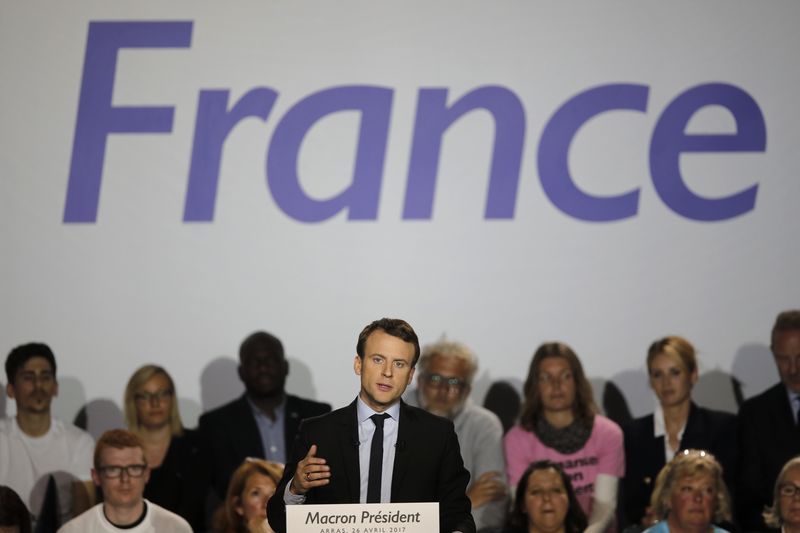PARIS (Reuters) - France's centre-right party, seeking to rebound after the defeat of its presidential candidate, said on Wednesday it could share power with Emmanuel Macron if he is elected, as pollsters predict, on May 7.
Macron, a 39-year-old centrist, is tipped to comfortably win a run-off vote against far-right leader Marine Le Pen, but the political movement he created a year ago faces a huge challenge in the follow-up legislative election in June.
With Macron and his "En Marche!" movement at risk of being in a minority in parliament, the centre-right party, The Republicans, hopes to secure enough National Assembly seats to demand a government role despite the defeat of its presidential contender Francois Fillon in a first-round vote on April 23.
The push for power-sharing appeared to come from a faction within The Republicans party around former president Nicolas Sarkozy, who lost out to Fillon in an attempt to win the nomination last November.
Striking such a deal with Macron, if possible, would allow the party to secure significant posts and exert control over important areas of policy.
Francois Baroin, who served as a finance minister under Sarkozy, on Wednesday publicly stated he was ready to work as prime minister in "cohabitation" with Macron.
Sarkozy, still a powerful force in right-wing politics, later said on social media that he would vote for Macron because the election of Le Pen, who wants to take France out of the European Union, would lead to serious consequences for France.
Baroin, 51 and a rising star within The Republicans, said in an interview on CNews television; "I will be available to ... head the government according to the will of the French people."
Any power-sharing deal between Macron and a right-wing prime minister, such as Baroin, would likely impose big constraints on him in pursuing economic policies that seek to balance state protection and pro-business reforms.
Before his exit, Fillon derided Macron's stated aim of being neither left-wing nor right-wing, pointing to the ex-banker's time as economy minister in the Socialist government of outgoing President Francois Hollande.
This judgement of Macron is still strongly felt among many of the Sarkozy-faction though others, loosely represented by more moderate former prime minister Alain Juppe, have suggested they may choose to join in a majority of support for Macron.
Baroin told CNews he would vote for Macron on May 7 without hesitation but that he would not join in helping his campaign. He said he would throw his energy into campaigning for The Republicans in the June parliamentary election.
The last time France had a cohabitation arrangement between the Elysee and the government was from 1997 and 2002 when right-wing president Jacques Chirac had to work with a Socialist government under Prime Minister Lionel Jospin.

The arrangement curbed Chirac's day-to-day control over the direction of the economy, reducing him largely to looking after foreign policy and defence.